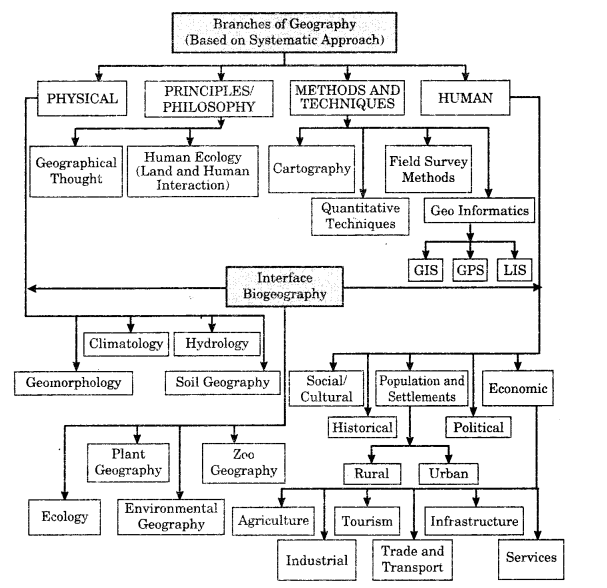Class 11 Geography Notes Chapter 1 Geography as a Discipline
We depend on the resources to sustain ourselves in the surrounding areas. Primitive societies subsisted on ‘natural means of subsistence’, i.e. edible plants and animals.
Importance of Geography: Geography helps us to understand the diversity and the causes and factors that have created it. Through geography we understand how spherical earth is presented through a map and we get information about soil, minerals, weather, climate, population, means of transport and communication, local landscape, etc. It also tells us about rivers, mountains, plateaus, plains, deserts, seas, lakes and cultural facts.
The term geography was first coined by Eratosthenese, a Greek scholar (276-194 BC.). The word has been derived from two roots from Greek language geo (earth) and graphos (description). Put together, they mean description of the earth. The earth has always been seen as the abode of human beings and thus, scholars defined geography as, “the description of the earth as the abode of human beings”.
Geographers do not study only the variations in the phenomena over the earth’s surface (space) but also study the associations with the other factors which cause these variations. For example, cropping patterns differ from region to region but this variation in cropping pattern, as a phenomenon, is related to variations in soils, climates, demands in the market, capacity of the farmer to invest and technological inputs available to her/him.
Geography as a discipline is concerned with three sets of questions:
- Some questions are concerned with the identification of the patterns of natural and cultural features as found over the surface of the earth. These are the questions about “what”?
- Second type of questions are related to the distribution of the natural and human/ cultural features over the surface of the earth. These are the questions about where?
- The third question is related to the explanation or the causal relationships between features and the processes and phenomena.
Many disciplines from natural sciences such as geology, pedology, oceanography, botany, zoology and meteorology and a number of sister disciplines in social sciences such as economics, history, sociology, political science, anthropology, etc. study different aspects of the earth’s surface.
A geographer is required to have a broad understanding of all the related fields, to be able to logically integrate them. A geographer should have some proficiency in mathematics and art, particularly in drawing maps. Geography is very much linked with the study of astronomical locations and deals with latitudes and longitudes. The cartographic and quantitative techniques require sufficient proficiency in mathematics, statistics and econometrics.
All the social science disciplines, viz. sociology, political science, economics and demography study different aspects of social reality. The branches of geography, viz. social, political, economic and population and settlements are closely linked with these disciplines as each one of them has spatial attributes.

The major approaches to study geography have been
- Systematic and
- Regional.
The systematic geography was introduced by Alexander Von Humboldt, a German geographer (1769-1859) while regional geography approach was developed by another German geographer and a contemporary of Humboldt, Karl Ritter (1779-1859).

Class 11 Geography Notes Chapter 1 Important Terms:
- Geography: Geography is concerned with the description and explanation of the areal differentiation of the earth’s surface. (Richard Hartshome); In other words, Geography studies the differences of phenomena usually related in different parts of the earth’s surface. (Hettner) GEOGRAPHY-XI
- Geo-morphology: It is concerned with the study of land forms, their evolution and related processes.
- Climatology: It is concerned with the study of structure of atmosphere and elements of weather and climates and climatic types and regions.
- Hydrology: It studies the realm of water over the surface of the earth including oceans, lakes, rivers and other water bodies and its effect on different life forms including human life and their activities.
- Soil Geography: It is concerned with the study the processes of soil formation, soil types, their fertility status, distribution and use.
- Social/Cultural Geography: It is concerned with the study of society and its spatial dynamics as well as the cultural elements contributed by the society.
- Population Geography: It studies population growth, distribution, density, sex ratio, migration and occupational structure etc.
- Settlement Geography: It studies the characteristics of rural and urban settlements.
- Economic Geography: It studies economic activities of the people including agriculture, industry7, tourism, trade, and transport, infrastructure and services, etc.
- Historical Geography: It studies the historical processes through which the space gets organised. In other words, it studies how history has influenced the geography of a region.
- Political Geography: It studies the impact of political events and studies boundaries, space relations between neighboring political units, delimitation of constituencies, election scenario and develops theoretical framework to understand the political behavior of the population.
- Bio-geography: It has emerged as a result of the interface between physical geography and human geography. It has three branches: Plant Geography, Zoo Geography and Ecology.
- Plant Geography: It studies the spatial pattern of natural vegetation in their habitats.
- Zoo Geography: It studies the spatial patterns and geographic characteristics of animals and their habitats.
- Ecology: It is concerned with the scientific study of the habitats characteristic of species.
- Environmental Geography: It is concerned with environmental problems such as land gradation, pollution and environment conservation.
Class 11 Geography Notes
<!–
–>